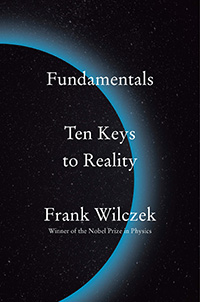 Frank Wilczek, Fundamentals: Ten Keys to Reality (New York: Penguin, 2021), 254pp.
Frank Wilczek, Fundamentals: Ten Keys to Reality (New York: Penguin, 2021), 254pp.
About 13.8 billion years ago, an unimaginably large and violent explosion gave birth to our cosmos. Out of nothing came something. Thanks to the power of a particular way of thinking over the last three hundred years (science), we now know that our cosmos is comprehensible, which fact Einstein called a "miracle." Pascal similarly confessed that although the cosmos "swallows me like a speck, through thought I grasp it."
However overwhelming the cosmos rightly feels, says the theoretical physicist Frank Wilczek, we shouldn't give in to "cosmic sizeism," for size isn't everything, and we human beings are big, too. We're "big enough to contain the outer universe in our minds." In this book that's written for a general audience (eg, there are no footnotes), Wilczek explains what we know about the nature of physical reality, how and why we know these things "very deeply," and where humans fit into this cosmic story.
The cosmos, it turns out, is remarkably simple ("a few ingredients, principles and properties") but also profoundly mysterious. It is both comprehensible and strange, a physical reality that can be scientifically explained but also philosophically contemplated. Wilczek intends for his book to transcend the dogmatism of both religious and scientific fundamentalism.
In his last chapter he argues for what he calls "complementarity," which is "the concept that one single thing, when considered from different perspectives, can seem to have very different or even contradictory properties." He gives the examples of quantum mechanics, and the debate about free will and physical determinism. We need complementarity, he says, because "the world is simple and complex, logical and weird, lawful and chaotic."
Despite its power to disabuse us of absurdities, we can't do justice to all the complexities of reality with scientific description alone: "Science tells us many important things about how things are, but it does not pronounce how things should be, nor forbid us from imagining things that are not. Science contains beautiful ideas, but it does not exhaust beauty. It offers a uniquely fruitful way to understand the physical world, but it is not a complete guide to life." Elsewhere Wilczek has described himself as more of a pantheist than an agnostic.
Frank Wilczek won the Nobel Prize in Physics in 2004 for work that he did as a graduate student. His many awards and honors include a MacArthur "genius" grant. Wilczek is the Herman Feshbach Professor of Physics at MIT, and a member of the National Academy of Sciences, the American Academy of Arts and Sciences, and the American Philosophical Society.
Dan Clendenin: dan@journeywithjesus.net


